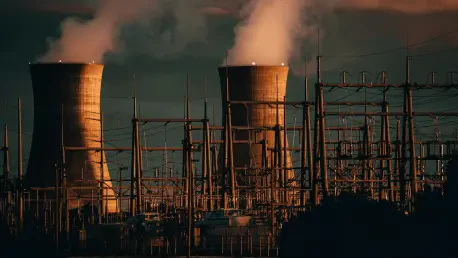The American nuclear industry currently grapples with profound challenges as recent budgetary and legislative proposals by House Republicans threaten its foundational support. These shifts jeopardize essential clean energy tax credits and Department of Energy (DOE) programs that have significantly propelled the industry forward. The Nuclear Energy Institute (NEI) CEO Maria Korsnick expresses the urgency of maintaining federal backing and reforms to ensure the sector’s growth aligns with future energy demands. These developments reveal a growing tension between proposed Republican budget cuts and the nuclear industry’s reliance on governmental subsidies to enhance its technological and operational capacities. Such political dynamics also prompt heightened advocacy efforts aimed at preserving vital financial provisions necessary for the industry’s sustainability and advancement.
Impact of Proposed Budget Cuts on Nuclear Industry
One of the central concerns revolves around the potential dismantling of key clean energy tax credits, which play a crucial role in supporting the nuclear industry. The Republican proposal suggests phasing out such credits, which could significantly hinder the sector’s capacity to innovate and improve. This proposal comes as a surprising pivot from earlier governmental support, specifically from the Trump administration, which had promoted nuclear energy as an integral component of an “energy dominance” strategy. The discontinuation of technology-neutral credits set for new and expanded projects commencing construction after 2028 marks a significant policy shift. For stakeholders, this represents not just a financial challenge but also a broader question about the future direction of U.S. energy policy and nuclear technology advancement.
The NEI’s advocacy response underscores the severity of the situation, orchestrating a collective effort from various stakeholders within the nuclear sector. A comprehensive letter to Congress emphasized the critical need to preserve specific Inflation Reduction Act (IRA) tax credits, which are fundamental to the industry’s operational sustainability. This letter carries signatures from a wide range of participants, including utilities, independent power producers, reactor developers, and nuclear services firms. Their unified stance is a testament to the widespread impact these budgetary proposals could have across the nuclear landscape, challenging an industry already striving to maintain its competitive edge in a rapidly evolving energy market.
Strategic Concerns and Regulatory Reforms
Beyond immediate financial concerns, there are overarching strategic worries about long-term industry sustainability and competitiveness. Proposed cuts not only risk undermining direct financial support but also threaten public and private initiatives essential for reinforcing the nuclear supply chain and workforce development. Maria Korsnick has voiced a critical call for structural reforms within the Nuclear Regulatory Commission. The absence of such reforms, coupled with insufficient federal backing, could exacerbate the existing challenges, pushing the industry further into uncertainty. This situation underscores a pressing need for consistent governmental policies to foster a nurturing environment for growth and innovation within the nuclear sector.
Additionally, the proposed budget cuts compound inherent challenges within the DOE’s frameworks, particularly concerning the Loan Programs Office (LPO) and the Advanced Reactor Demonstration Program (ARDP). The LPO, offering billions in loan guarantees, has been instrumental in supporting emerging energy projects, including substantial commitments like the $1.5 billion to Holtec International’s Palisades reactor restart project. The possibility of clawing back unobligated LPO funds threatens to severely limit industry progress, posing a greater risk than the repeal of clean energy tax credits alone. The magnitude of potential investments, notably the over $64 billion in nuclear-specific LPO applications for the current fiscal year, illustrates what is potentially at stake.
Challenges in Advanced Reactor Projects
The DOE’s Advanced Reactor Demonstration Program (ARDP), intended to commercialize advanced reactor designs, faces an uncertain future amid these budgetary discussions. With congressional appropriations of nearly $2.5 billion already allocated, significant corporate investment and project development by companies like X-energy and TerraPower hinge on these funds. TerraPower, for instance, is actively developing non-nuclear aspects at its Wyoming site and seeking Nuclear Regulatory Commission (NRC) approval for its reactor designs for demonstration projects targeting completion by the early 2030s. The absence of timely project updates or funding announcements on the DOE’s ARDP platforms fuels further concern about the continuity of these critical funds.
This uncertainty jeopardizes the potential breakthroughs in reactor technology that could definitively impact U.S. nuclear capabilities. Without clear direction and reassurance from the DOE, the progress of advanced reactor projects could be stunted, hindering the possibility of pioneering newer, innovative technologies in nuclear energy. The fallout could dampen excitement and investment in future-oriented projects, potentially stifling innovation within the nuclear sector at a time when global competition in clean energy technology is intensifying. Thus, it becomes vitally important for the industry to secure its financial foundation and regulatory pathway to future success.
Navigating Future Uncertainties in Nuclear Energy
A key concern involves the possible dismantling of crucial clean energy tax credits essential for the nuclear industry. The Republican proposal aims to phase out these credits, potentially stalling innovation and progress within the sector. This marks a surprising shift from the previous support shown by the Trump administration, which viewed nuclear energy as vital for achieving “energy dominance.” The planned cessation of technology-neutral credits for new projects after 2028 highlights a significant change in policy. To stakeholders, this isn’t just a financial hurdle; it raises broader questions about the future direction of U.S. energy policy and the advancement of nuclear technology.
In response, the Nuclear Energy Institute (NEI) has ramped up advocacy efforts, highlighting the critical situation by mobilizing stakeholders across the nuclear sector. A comprehensive letter to Congress stressed the necessity of preserving vital Inflation Reduction Act (IRA) tax credits. Utilities, reactor developers, and nuclear services firms are among the signatories, showing the widespread impact these budget proposals could have on an industry striving to keep its competitive edge.









